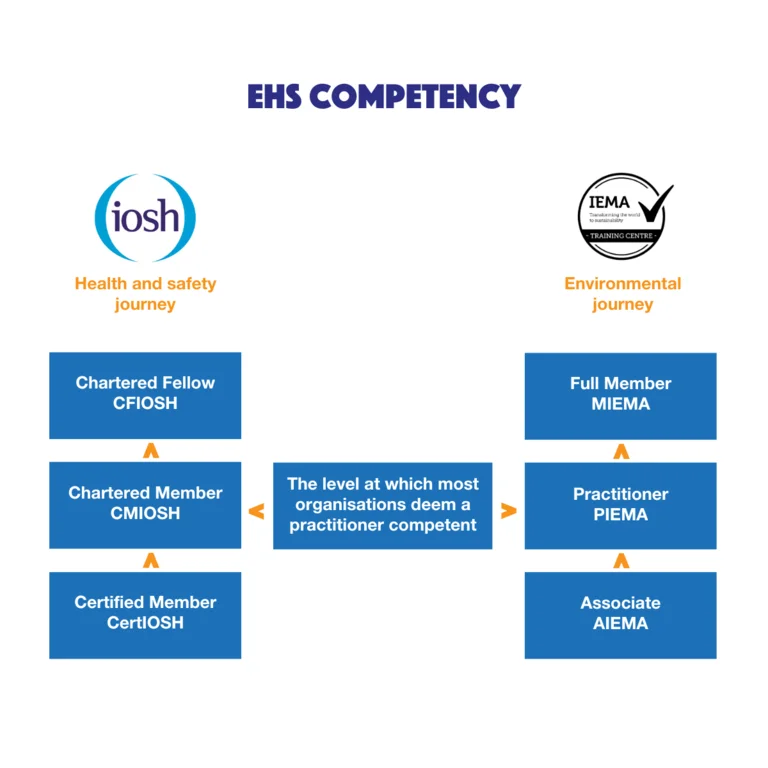
I am delighted to tell you that I passed my PRI for the CMIOSH! I couldn’t have done it without your invaluable help, and importantly your belief in me at a time when I was struggling to believe in myself. Thank you so much for all your brilliant advice!
Available resources
A: IOSH stands for Institute of Occupational Safety and Health. They are the Chartered body and largest membership organisation for health and safety professionals. They support OSH professionals to continuously develop, get recognised and trusted for their expertise through IOSH membership. IOSH also offer a range of qualifications and courses.
A: IOSH have six membership grades. Each grade reflects a person’s experience and ongoing investment in both career and the wider occupational safety and health profession.
The levels are as follows: Student, Affiliate, Technical (TechIOSH), Certified (CertIOSH) - used to be Graduate (GradIOSH), Chartered (CMIOSH), Chartered Fellow (CFIOSH).
A: Make UK are a trusted partner of IOSH and accredited to deliver a range of IOSH courses. Our hugely experienced team, which includes Chartered Members and Chartered Fellows, is on hand to offer advice and actively mentor you through your professional journey.
A: NEBOSH stands for National Examining Board for Occupational Safety and Health. They are an awarding body that offers a range of health, safety, and environmental management qualifications. Some NEBOSH qualifications meet the academic requirements for IOSH membership. For example, the NEBOSH General Certificate in Occupational Health and Safety meets the academic requirements for Technical Membership (TechIOSH), with appropriate experience. For more information, please watch the health and safety IOSH explainer video on this page.
A: IEMA (Institute of Environmental Management and Assessment) is a global professional body for individuals and organisations working, studying, or interested in the environment and sustainability. IEMA provide resources and tools, research and knowledge sharing along with training and qualifications to meet the real-world needs of members. They offer support to anyone with environment and sustainability responsibilities so they can achieve their personal and organisational goals.
A: IEMA have seven membership grades. Each grade reflects a person’s knowledge and experience and the wider environmental/sustainability agenda.
The levels are as follows: Student, Affiliate, Graduate (GradIEMA), Associate (AIEMA), Practitioner (PIEMA), Full (MIEMA), Fellow (FIEMA).
A: Make UK have an excellent relationship with IEMA and are accredited to deliver a range of IEMA courses. Make UK are the only learning partner accredited to deliver the IEMA Diploma in Sustainable Business Practice. Our hugely experienced team, which includes Full Members of IEMA, are on hand to offer advice and actively mentor you through your professional journey.
A: IOSH/IEMA membership is a great way to be recognised for your achievements (education, training, and experience) and demonstrates your impact to employers.
A: Which membership grade is right for you will depend on your training and education, your experience in health and safety (IOSH) or the environment/sustainability (IEMA) and what you want out of membership.
We would recommend reviewing the information provided regarding each membership grade on the IOSH/IEMA websites.
Make UK offer a range of accredited courses to enable people to achieve their personal goals and progress their membership. For example, AIEMA (Associate membership of IEMA) can be achieved via IEMA’s Foundation Certificate in Environmental Management, which is offered by Make UK. All courses are developed and delivered by professional trainers and consultants with lots of real-life and training experience who will mentor you from start to finish and thereafter to help you achieve your goals.
A: CPD stands for Continuing Professional Development and is defined as learning experiences that help you develop and improve your professional practice. Examples of CPD include undertaking training courses or formal qualifications, peer review, mentoring or shadowing, participating in professional networks, communities of practice, special interest groups and discussion forums. CPD ensures that you continue to be proficient and competent in your profession.
For example, CPD will show if there are new or amended regulations you need to be aware of. CPD will equip you with skills to further your career and drive continuous improvement. A sample CPD record can be found within the Resources section on this page.
The ICO can ask you questions via an information notice (which you must answer) or issue an enforcement notice (which you must comply with). It can also enter and inspect premises. For serious breaches, the ICO can issue a penalty notice (i.e. a fine). The maximum fine is £17.5 million, or 4% of an undertaking’s global annual turnover, whichever is higher, but the amount will be determined based on the type of breach concerned and the facts of the individual case. The ICO has recently published new guidance setting out the circumstances in which it might issue a penalty notice, and how the amount of any fine will be determined.
As outlined in the guidance, the ICO may impose a fine by issuing a penalty notice where a person has failed (or is failing) to comply with certain provisions of the UK General Data Protection Regulation (the ‘UK GDPR’) or Data Protection Act 2018 (the ‘DPA’). This could include, for example, where someone has failed or is failing to comply with rules relating to: the principles of processing, such as retaining data when it is no longer needed; rights conferred on data subjects, such as providing incomplete information when responding to a subject access request; obligations placed on controllers and processors, such as failing to report a personal data breach to the ICO; and the principles for transfers of personal data outside the UK.
The ICO may also impose a fine where a person has failed to comply with an information notice, assessment notice or enforcement notice given under Part 6 DPA. This could include, for example, where a person has failed to or is failing to: provide information that the Commissioner reasonably requires; allow the Commissioner to inspect or examine documents, information, equipment or material; or comply with a requirement set out in an enforcement notice (such as a requirement to rectify or erase personal data or otherwise comply with the UK GDPR or DPA 2018). The guidance explains that, when assessing whether it is appropriate to issue a penalty notice, the Commissioner will have regard to various factors including:
- the seriousness of the infringement or infringements;
- any relevant aggravating or mitigating factors; and
- whether imposing a fine would be effective, proportionate and dissuasive.
- Step 1: Assessment of the seriousness of the infringement.
- Step 2: Accounting for turnover (where the controller or processor is part of an undertaking).
- Step 3: Calculation of the starting point having regard to the seriousness of the infringement and, where relevant, the turnover of the undertaking.
- Step 4: Adjustment to take into account any aggravating or mitigating factors.
- Step 5: Assessment of whether the fine is effective, proportionate and dissuasive.
As noted above, breaches of data protection rules can be costly, so it is important to make sure you understand the relevant rules and take active steps to comply with them.
If you are a Make UK subscriber, you can speak to your regular adviser for guidance on data protection issues and/or access further information in the Employee data and monitoring section of our HRL Resources. For information about our suite of essential template GDPR documents, see here.
If you are not a Make UK subscriber, you can contact us for further support on this topic or to access our resources. Please click here for information on how we can help your business.
EHS Competency Training
As early partners of IOSH and IEMA, Make UK understand the confusing world of EHS competency, so when you undertake training with us, course completion is just the beginning.
The Management of Health & Safety at Work Regulations, 1999 say competency is “having sufficient training & experience or knowledge & other qualities.”
If you work, or are thinking of working in an EHS role, there is nothing more important than competence. But, competence cannot be achieved by training alone. That’s why when you study with Make UK, you’ll be supported all the way along your development journey. Whether that’s a Chartered Member of IOSH (Health and Safety) or a Full Member of IEMA (Environment), your relationship with us doesn’t end when you leave the classroom.
Don’t just pass, maximise your potential.
Competency Course Categories

Health & Safety
For those making health and safety their career
Environment
For those in environment / sustainability rolesEHS Competency Training
As early partners of IOSH and IEMA, Make UK understand the confusing world of EHS competency, so when you undertake training with us, course completion is just the beginning.
The Management of Health & Safety at Work Regulations, 1999 say competency is “having sufficient training & experience or knowledge & other qualities.”
If you work, or are thinking of working in an EHS role, there is nothing more important than competence. But, competence cannot be achieved by training alone. That’s why when you study with Make UK, you’ll be supported all the way along your development journey. Whether that’s a Chartered Member of IOSH (Health and Safety) or a Full Member of IEMA (Environment), your relationship with us doesn’t end when you leave the classroom.
Don’t just pass, maximise your potential.